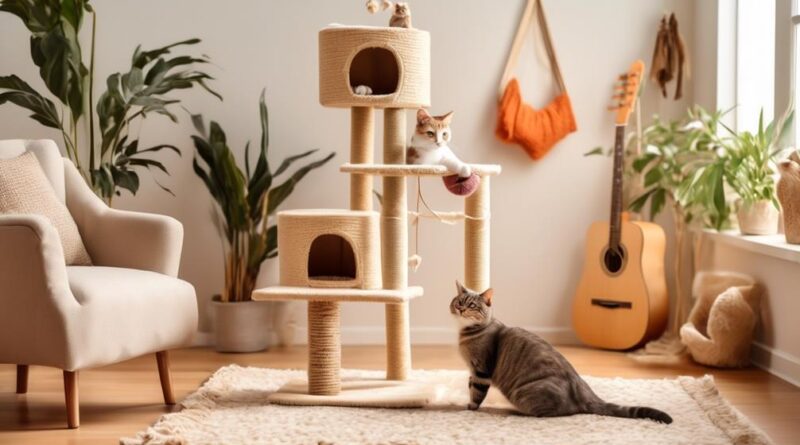Essential Tips for Post-Adoption Cat Care
When you bring a new cat into your home, it's essential to understand that the first few weeks are crucial for helping them adjust to their new environment.
However, there are some lesser-known tips and considerations that can make the transition smoother and set the stage for a happy and healthy life with your new feline friend.
From creating a safe space to understanding their nutritional needs and establishing a routine, there are several key aspects of post-adoption cat care that can significantly impact your pet's well-being.
As you navigate this new chapter, it's important to be well-informed and prepared to provide the best care for your furry companion.
Preparing Your Home
Before bringing your new cat home, make sure to create a comfortable and safe environment for them to explore and adjust to their new surroundings. Start by cat-proofing your home. Cats are curious creatures, so it's important to remove any small objects that they could potentially swallow, secure electrical cords, and ensure that any toxic plants or substances are out of reach. Additionally, consider providing a variety of scratching posts and toys to keep your cat entertained and discourage them from damaging furniture.
When introducing your new cat to other pets in the household, it's crucial to proceed with patience and caution. Begin by keeping your new cat in a separate room for the first few days to allow them to acclimate to their new environment without feeling overwhelmed. During this time, let your other pets become familiar with your new cat's scent by exchanging bedding or using a pheromone diffuser. Once your new cat seems more comfortable, you can start the introduction process by allowing them to sniff each other under a closed door or through a baby gate.
Remember to supervise all interactions between your new cat and other pets, and be prepared to intervene if necessary. It's normal for there to be an adjustment period, so be patient and provide positive reinforcement for good behavior. By taking these steps, you can help ensure a smooth and successful transition for your new feline friend.
Establishing a Routine
As you acclimate your new cat to their surroundings and introduce them to other pets, it's important to establish a consistent routine to help them feel secure and comfortable in their new home. Cats thrive on routine, so creating a predictable daily schedule will provide them with a sense of stability and security.
Here are some essential tips for establishing a routine for your newly adopted cat:
- Bonding activities: Set aside dedicated time each day for bonding activities with your cat. This could include gentle grooming sessions, interactive playtime, or simply sitting quietly together. These activities will help strengthen the bond between you and your cat, providing them with reassurance and comfort.
- Daily schedule: Cats appreciate structure, so try to feed them at the same times each day and keep their litter box clean and accessible. Consistency in meal times and bathroom breaks can help prevent anxiety and promote a sense of security for your cat.
- Mental stimulation: Incorporate mental stimulation into your cat's daily routine. Provide puzzle toys, interactive feeders, or even create a DIY scavenger hunt for your cat to keep their mind engaged and active.
- Exercise routine: Cats need regular exercise to stay healthy and happy. Designate time for active play sessions to keep your cat physically and mentally stimulated. Use toys that encourage natural hunting behaviors, such as feather wands or laser pointers, to keep your cat entertained and engaged.
Nutrition and Feeding

To ensure optimal health and well-being for your newly adopted cat, it's essential to establish a balanced and nourishing diet tailored to their specific nutritional needs. Understanding your cat's dietary requirements is crucial in maintaining their overall health.
Cats are obligate carnivores, which means their diet should consist primarily of meat. High-quality commercial cat food that lists meat as the main ingredient is a good choice to ensure your cat receives the necessary nutrients. Additionally, consider your cat's weight management when selecting their diet. If your cat needs to lose or gain weight, consult your veterinarian to determine the appropriate type and amount of food to feed them.
Meal timing is also an important aspect of cat care. Establish a feeding schedule and stick to it to provide your cat with a sense of routine and stability. Most adult cats do well with two meals a day, while kittens may require more frequent feeding.
Treat options should be given sparingly and in moderation. Opt for healthy treats specifically formulated for cats and avoid feeding them human food, especially items that are toxic to cats such as chocolate, onions, and garlic.
Veterinary Care
Ensuring your cat's health also involves regular veterinary care, which plays a crucial role in maintaining their well-being. Here are some essential aspects of veterinary care to keep in mind:
- Preventative Care and Vaccinations: Regular veterinary visits are crucial for preventative care, including vaccinations against common feline diseases such as rabies, feline leukemia, and distemper. These vaccinations help protect your cat from potential illnesses, keeping them healthy and happy.
- Spaying/Neutering: It's important to discuss spaying or neutering your cat with your veterinarian. Besides preventing overpopulation, spaying or neutering can also have health benefits for your cat, such as reducing the risk of certain cancers and curbing certain behavioral issues.
- Dental Care: Dental health is often overlooked but is crucial for your cat's overall well-being. Regular dental check-ups and cleanings can prevent dental diseases and maintain your cat's oral hygiene, leading to better overall health.
- Regular Check-ups and Health Monitoring: Regular veterinary check-ups allow the vet to monitor your cat's health, catch any potential issues early, and provide appropriate care. These visits are also an opportunity for you to discuss any concerns or questions you may have about your cat's health.
Creating a Safe Environment
Creating a safe environment for your newly adopted cat involves carefully assessing your home for potential hazards and making necessary adjustments to ensure their well-being. Start by cat-proofing your living space. This means securing windows and balcony doors to prevent accidental falls. Hide electrical cords and keep toxic plants out of reach. Consider investing in a sturdy scratching post to deter your cat from clawing furniture.
To provide environmental enrichment, create vertical spaces for your cat to climb and explore. Install shelves or window perches to satisfy their natural instincts to climb and observe their surroundings. Additionally, provide a variety of toys to keep them mentally and physically stimulated. Puzzle feeders and interactive toys can help prevent boredom and encourage exercise.
Ensure there are quiet spaces for your cat to retreat to when they need alone time. Consider setting up a cozy bed in a secluded area where they can feel safe and secure.
Creating a safe and enriching environment for your cat is essential for their well-being and happiness. By taking these simple steps, you can help your newly adopted cat feel right at home and ensure they thrive in their new environment.
Socialization and Playtime
After securing your living space and creating a safe environment for your newly adopted cat, it's crucial to focus on socialization and playtime to help them adjust and thrive in their new home. Socializing and playtime activities are essential for your cat's physical and mental well-being. Here are some tips to ensure your cat gets the socialization and playtime they need:
- Interactive Toys for Bonding: Invest in interactive toys such as feather wands, laser pointers, and puzzle feeders to engage your cat in play and bonding activities. These toys can stimulate their natural hunting instincts and provide mental stimulation while strengthening the bond between you and your cat.
- Designated Enrichment Opportunities: Create designated areas in your home for play and enrichment. This can include cat trees, scratching posts, and cozy hiding spots. These areas offer your cat the opportunity to explore, play, and retreat when they need some alone time.
- Regular Socializing Sessions: Schedule regular socializing sessions with your cat. This can involve gentle petting, grooming, and interactive play. By consistently engaging with your cat in these activities, you help build trust and strengthen your bond with them.
- Rotate and Introduce New Toys: Keep your cat's environment stimulating by rotating their toys and introducing new ones periodically. This prevents boredom and encourages curiosity, ensuring that they have a variety of engaging activities to enjoy.
Behavior and Training

If your newly adopted cat is exhibiting any concerning behaviors, addressing them through positive reinforcement and consistency can help encourage positive changes. Positive reinforcement, such as giving treats or praise when your cat displays desirable behaviors, is an effective way to encourage good behavior. For example, if your cat is using the litter box appropriately, reward them with a treat or verbal praise to reinforce this positive habit.
When it comes to litter box habits, providing a clean and accessible litter box is crucial for encouraging proper usage. Make sure to scoop the litter box daily and change the litter regularly. Additionally, if you have multiple cats, it's important to have a sufficient number of litter boxes to prevent territorial issues and promote good litter box habits.
Consistency is key when it comes to training your cat. Establishing a routine for feeding, playtime, and litter box maintenance can help your cat feel secure and confident in their environment. Cats thrive on consistency, so maintaining a predictable schedule can help reduce stress and encourage positive behaviors.
If your cat is displaying undesirable behaviors, it's important to avoid punishment. Instead, focus on redirecting their behavior and providing positive reinforcement for good behavior. With patience and consistency, you can help your newly adopted cat adjust to their new home and develop positive behaviors.
Monitoring Health and Wellness
To ensure your newly adopted cat's well-being, regularly monitoring their health and wellness is essential, building on the foundation of positive behaviors established through consistent training and care.
Paying attention to your cat's grooming and hygiene is crucial for their overall health. Brush your cat's coat regularly to prevent mats and tangles, and trim their nails to avoid overgrowth and discomfort. Additionally, schedule regular dental check-ups to maintain their oral hygiene and prevent dental issues.
Stress management is another important aspect of monitoring your cat's health and wellness. Cats can experience stress due to changes in their environment, so it's important to provide them with a safe and comfortable space where they can retreat if they feel overwhelmed. You can also use interactive toys and regular play sessions to help alleviate stress and keep your cat mentally stimulated.
Regular veterinary check-ups are essential for monitoring your cat's overall health. Schedule annual wellness exams to ensure that your cat is up to date on vaccinations and to detect any potential health issues early on.
Lastly, keep an eye on your cat's weight and diet to prevent obesity-related health problems, and consult your veterinarian if you notice any changes in their eating habits or weight.
Frequently Asked Questions
How Can I Help My New Cat Adjust to a Multi-Pet Household?
When introducing new pets, it's essential to take things slow and let them build trust with each other.
Start by keeping the new cat in a separate room to give them time to adjust to the new environment.
Swap bedding between pets to familiarize them with each other's scents.
Slowly introduce them through a barrier, like a baby gate, and supervise their interactions until they feel comfortable with each other.
What Are Some Tips for Traveling With My Adopted Cat?
When traveling with your adopted cat, it's essential to ensure they've access to a familiar litter box in the car. Using carriers can help reduce their anxiety during the journey.
Introduce the carrier to your cat before the trip, making it a comfortable and safe space. Additionally, consider using calming pheromone sprays or treats to help ease their nerves.
These steps can make the travel experience more pleasant for both you and your feline friend.
How Can I Discourage My Cat From Scratching Furniture?
To discourage your cat from scratching furniture, try using training techniques. Provide scratching posts and pads as alternative surfaces. Use positive reinforcement by rewarding your cat when they use these designated areas.
Deter them from the furniture by covering it with double-sided tape or placing aluminum foil on the edges. Additionally, regularly trim your cat's claws and use synthetic pheromone sprays to create a calming environment.
Are There Any Special Considerations for Caring for an Older Adopted Cat?
When caring for an older adopted cat, there are a few special considerations to keep in mind. Senior cat care involves regular veterinary check-ups to monitor their health and address any age-related issues.
Be attentive to any behavioral issues as your cat adjusts to their new environment. Provide a comfortable, quiet space for them to relax and plenty of love and attention. This will help your senior cat feel secure and content in their new home.
How Can I Help My Adopted Cat Overcome Fear or Anxiety?
To help your adopted cat overcome fear or anxiety, focus on building trust and confidence.
Use calming techniques like creating a safe space and providing positive reinforcement.
Spend quality time with your cat, offering gentle and reassuring interactions.
Gradually introduce new experiences to boost their confidence.
Patience and consistency are key in helping your cat adjust and feel secure in their new environment.
Conclusion
Now that you have your new feline friend, remember to:
- Create a safe and loving environment.
- Establish a routine.
- Provide proper nutrition and veterinary care.
- Prioritize socialization and playtime.
It's also important to:
- Monitor their health and wellness.
- Address any behavioral issues with patience and positive reinforcement.
With these essential tips, you can ensure a happy and healthy life for your newly adopted cat.
